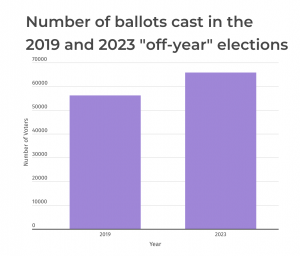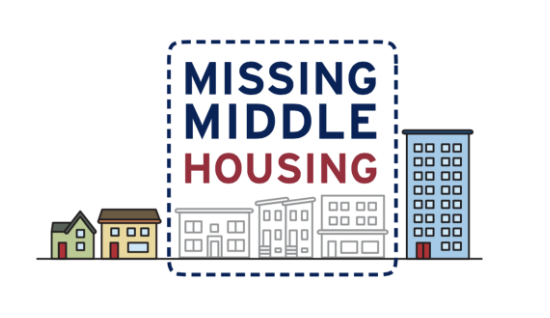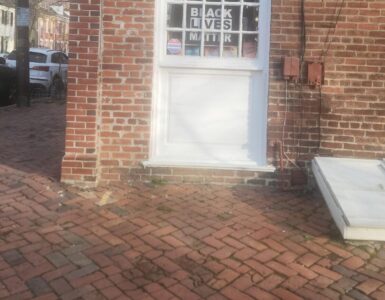The Arlington County Board will wrestle with zoning again next year as new board members want to revisit the recently enacted “missing middle” plan.
Susan Cunningham, a newly elected county board member, said she plans to take action in January to rework the “missing middle” housing plan to ensure that it is actually creating affordable housing in Arlington, since constituents asked about this the most during her campaign.
The “missing middle” plan, renamed the “expanded housing options” plan, allows Arlington officials to issue permits allowing for the construction of multi-unit buildings with four-to-six units and allows homeowners to transform single family homes into multi-unit residential buildings. The plan reverses the single-family-only zoning ideal.
The “missing middle” refers to buildings which are between single-family houses and apartment buildings in scale.
The current county board voted to implement the zoning plan in March. Since then, the plan has been the talk of the county.
Ten Arlington residents filed a lawsuit in April in Arlington County Circuit Court against the county to prevent lawmakers from issuing more expanded housing option (EHO) permits.
As of Nov. 22, the county had approved 21 EHO permits.

David Barrera, communications and policy manager for the Arlington County Board, said there is nothing stopping Cunningham or other new board members from being able to address the plan right away when they assume their roles on the board in January.
“There isn’t a period where they are restricted from asking questions or making requests or making amendments to motions,” Barrera said.
Cunningham and Maureen Coffey, another new county board member, will assume their roles on the board with the same privileges and responsibilities as other board members, according to Barrera.
Resident Benjamin Keeney said the county board should focus on how to expand the zoning plan in the future.
“One thing that they need to think about is should they be more or less aggressive depending on the outcome of this phase,” Keeney said.
Currently, permits have only been approved for buildings in two districts that include one-family dwelling and restricted two-family dwelling zones.
Keeney said he thinks the plan opens Arlington’s doors to diversity, especially in terms of income brackets measured by the area’s median income (AMI).
“If people who are making 100% of the AMI in Arlington can’t afford to live here, that tells us something,” Keeney said.
Keeney said the plan could increase homeownership opportunities.
“That’s something that a lot of people are hesitant to agree with. Nine times out of 10 developers try to saturate the market with rentals,” Keeney said. “I’m cautiously optimistic that it could be a positive thing.”
Many Arlington residents say that the housing issue was the number one motivator for a surging voter turnout in this year’s election.
Over 65,000 people cast a ballot in the Arlington election in November, which is about 10,000 more ballots than the county was expecting.

Cunningham said addressing this “missing middle” issue during her term means facilitating input from all voices.
“Sometimes that’s folks who are eager to give input, and sometimes you have to go searching and seeking it,” Cunningham said.
Matthew Hurtt, the chair of the Arlington County Republican Committee, said both progressives and libertarians partnered together to create the missing middle plan.
“One of the major arguments was that it was going to bring affordable housing to Arlington, and that is a lie,” Hurtt said. “It is a lie and they knew it was a lie and we are seeing it in the approval of permits that have been requested to upzone single family units.”
Hurtt said he believes the plan has actually had the opposite intended effect on property value.
“The argument was properties would be cheaper on up zoned lots, and every single property for which a permit has been applied and approved, the value has gone up,” Hurtt said.
Steve Baker, chair of the Arlington County Democratic Committee, said he believes the issue is what brought many voters out on election day.
“It was the local topic on people’s minds and it certainly was an important topic during the democratic primary,” Baker said. “Housing will always be an important topic in any community.”
Because of all the chatter among residents, Cunningham said she thinks the new board needs to give the plan some attention.
“Right now there’s a manner of a dashboard but it is really just counting the number of permits and where they’re landing- not looking at if it is actually creating anything affordable, if it is creating ownership opportunities or only rentals or if these permits that were issued for the expanded housing opportunity are really translating to build of projects,” Cunningham said.
She also said the current board could have done better in “communicating crisply and clearly to the community.”
“What is the issue? What does it look like to solve it? And why do we think this is a solution that works? This was a big issue during the conversation around housing and zoning,” Cunningham said.
Cunningham said she is looking forward to ensuring the new zoning policy is monitored closely and adjusted, so that the plan achieves objectives that the current board laid out for the plan to begin with- expand housing and make Arlington accessible to more people.
The city council in Arlington’s neighbor, Alexandria, is scheduled to vote on a similar zoning plan tonight that would create additional housing and eliminate single-family only zones.















Add comment